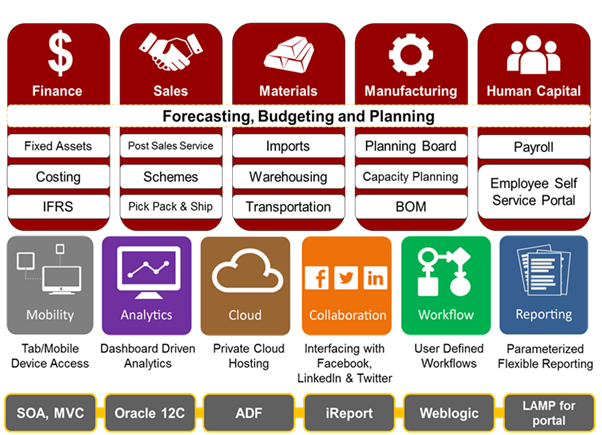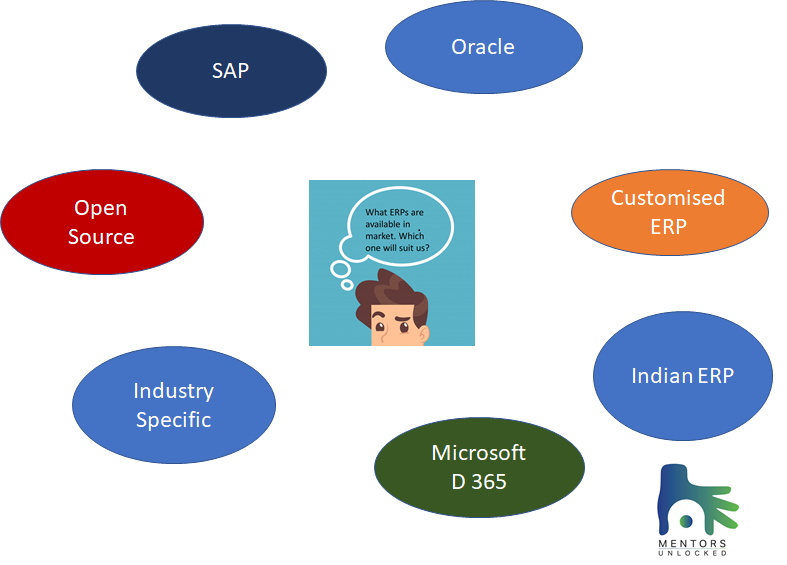This week we will like to share information on ebizframe, an ERP from Eastern Software Systems. This is in continuation of our series ERP Focus started with our blog https://mentorsunlocked.com/erps-in-indian-market/ . Last time we had discussed SAGE ERP ( https://mentorsunlocked.com/erp-focus-series-sage-erp/ ).
Eastern Software Systems was founded by Mr. Sanjay Agarwala and today has more than 350 employees. The company focuses on markets abroad with Small and Medium Enterprise segment as its target customer. It is one of the rare ERP companies that have more installations outside of country than within the country. ebizframe is its flagship product with more than 1200+ installations. Besides India, it operates in more than 25 countries in Africa, middle East and South East Asia.
ebizframe is layered on Oracle database. It has a modular structure and hence provides flexibility to the user company pick and choose the features or complexities it would like to add. For example, The Finance and Accounts module has the basic features such as GL with AP and AR. The company can choose option of reporting to comply with IFRS, if need be. Customers can opt for planning board and planning module in production, asset register module, sub-contracting in procurement, distribution management, packing and dispatch in inventory management etc. The ERP reflects experience of ESS with diverse industries. For example, in Sales it provides option of choosing tendering and bidding module for EPC/ B2B sales and Point of Sale module for companies with retail outlets (in B2C segment). As with most ERPs, the customers can scale ERP by adding modules as per their convenience and plans.

The strength of ebizframe is simplicity and User level configurability where lot of functionalities have been delegated to users like configuration of Workflows and Reports. Companies wanting to go paperless can opt to for it with in-built document management system. For example, the complete procurement to pay cycle can be made completely paperless with tagging of soft copies of bids and copy of contract. Like in all other ERPs, all processes related to P2P cycle are digitized or electronic. Similarly, it also offers integration with other technologies such as BI(Business Intelligence) Tools, AI(Artificial Intelligence) and ML(Machine Learning), Automation and data capturing technologies like bar code readers, QR code etc. Existing software such as Employee portals and vendor portals can also be integrated with it.
The other big advantage ESS has its flexibility in drawing Management Information Reports. Like all ERPs, it provides a library of standard reports. With absolutely Zero programming knowledge, the users can also configure the reports themselves and create new reports/graphs based on the information they seek or analysis they want to perform through an extremely powerful feature called “Flexi Reports”.
The Configurable Workflow and Reports is a very powerful feature which helps increase usage amongst Users as well as minimize/eliminate the dependence of User Companies on the ERP Vendor for change of Workflows/Reports required post implementation which is a very common challenges faced by User companies post implementation.
Use of PWAs(Progressive Web Applications) allows it to be used on desktop and handheld devices such as mobiles and tablets. The company can choose from installation on its own server(on-premise) or cloud and the cost of licenses and use would change accordingly. The cost of implementation can be as low as Rs. 0.5 million ( USD 6-7k) for a module with basic features but a comprehensive installation for integrating inventory and finance and accounts alongside production, planning and HR may cost Rs. 1.0-15 millions ( for 10 users). The cost may go up with complexity, Vertical, Customization Requirements and size.
As per Mr. Prakash Gopalani of ESS, the company outscores its branded competitors with its service during and after implementation. The company is willing to add customization to suit specific needs of its customers and is willing to go that extra mile after implementation to ensure that its customers do not suffer and are able to get a system which is close to their specific and critical business requirements.

